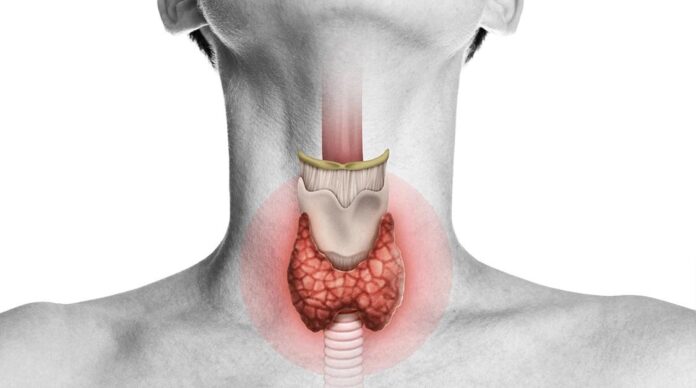The thyroid gland is a butterfly-shaped organ on the front of your neck, under your voice box. It makes two hormones: T3 and T4. The body needs a certain amount of these hormones to function correctly. Normally, the pituitary gland tells the thyroid gland how much to release into the bloodstream.
The Function of the Thyroid Gland
The thyroid gland is a butterfly-shaped organ in the front of your neck just below the Adam’s apple. It consists of two lobes, one on each side, and is joined by a small bridge of tissue called the thyroid isthmus.
The thyroid gland’s function and the thyroid cartilage anatomy involve several processes that make it a vital part of your body’s endocrine system. It produces and secretes hormones into your bloodstream to control how your body turns food into energy. This is all supervised by the pituitary gland, which sits beneath your brain. It monitors how much hormone is being produced by the thyroid and sends out a special hormone called thyroid stimulating hormone (TSH) when it senses a problem. When the pituitary and thyroid glands do not function correctly, the thyroid gland can’t produce enough hormones to meet your body’s needs. If you have a thyroid problem, you may experience various health problems because your body can’t use the hormones it needs to operate correctly.
The Thyroid Gland’s Hormones
The thyroid gland is part of your endocrine system, which makes hormones that regulate many functions in your body. These hormones include triiodothyronine (T3) and thyroxine (T4), which control your metabolism — the chemical processes in your body that break down food into energy. Thyroid hormones affect your heart rate, body temperature, breathing, weight, digestion and how well you burn calories. Thyroid hormone levels can be low, called hypothyroidism, or high, called hyperthyroidism. These imbalances can cause some problems, including feelings of confusion or depression, insomnia, irritability, weight gain or loss and muscle aches. They can also lead to more serious health issues, such as cancer of the thyroid or Graves’ disease. Your pituitary gland, another endocrine gland in your brain, tells the thyroid to produce more or less of these hormones. When the pituitary senses that your thyroid hormone level is too low, it releases a thyroid-stimulating hormone into your bloodstream. This stimulates your thyroid gland to make more T3 and T4 hormones. The hormones then circulate through your bloodstream and are absorbed into the tissues. Your thyroid hormones are important for regulating brain function and sex hormones. They help control a variety of neurotransmitters that communicate between your brain, adrenal gland and ovaries.
The Thyroid Gland’s Unique Ability to Pick Up Iodine
The thyroid gland is unique because it can pick up iodine from the blood and incorporate it into its hormones. It can also make calcitonin, a hormone that contributes to bone strength. Iodine is important because it helps the thyroid gland make thyroxine (T4) and triiodothyronine (T3), two key hormones. These hormones regulate the body’s metabolic rate, heart, muscle and digestive function, brain development and bone maintenance. Thyroid hormones are released into the bloodstream through a complex system that relies on the pituitary gland, which sends signals to the thyroid gland. The thyroid gland then releases certain hormones into the bloodstream, depending on your body’s needs. Once in the blood, these hormones attach to transport proteins that carry them throughout your body. The pituitary gland tells the thyroid follicular cells to release more or less T3 and T4 depending on how much iodine is in your bloodstream, and so on. When too little iodine is in your body, the thyroid gland cannot produce enough T3 and T4. This is called hypothyroidism. It can cause various symptoms, including thyroid enlargement (goiter) and slowing metabolism. This can also affect your cognitive abilities and mood. It may also impact fetal development, increasing your risk of miscarriage or stillbirth.
The Thyroid Gland’s Role in Weight Management
Thyroid hormones help control many vital body functions. This includes heart rate, the rate at which calories are burned, skin maintenance, growth and heat production, fertility and digestion. Normally, your thyroid gland makes the exact number of hormones needed to regulate your metabolism. TSH (thyroid stimulating hormone) from your hypothalamus stimulates follicular cells in your thyroid to release thyroxine and triiodothyronine. These hormones are essential for maintaining normal metabolic functions and can help to regulate your weight if you are overweight or obese. Your endocrine system is a complex network of glands and hormones that interact to produce the different hormones your body needs. This network is also sensitive to small changes in your blood circulation. This feedback loop keeps the levels of hormones in your blood stable and reacts to small changes immediately. The follicular cells of your thyroid are very specialized in extracting, absorbing and incorporating iodine from the blood into the thyroid hormones they make. If you do not have enough iodine in your diet, you cannot make adequate amounts of thyroid hormones.









![Anso FG Reviews: UPDATED 2024 [ansofg.com] Anso FG Reviews UPDATED 2024 [ansofg.com]](/wp-content/uploads/2023/12/Anso-FG-Reviews-UPDATED-2024-ansofg.com_-100x70.png)








